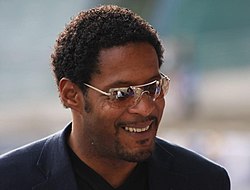| II Ibero-American Championships | |
|---|---|
 | |
| Dates | 27 – 28 September |
| Host city | Havana, Cuba |
| Venue | Estadio Pedro Marrero |
| Events | 36 |
| Participation | 17 nations |
| Records set | 19 championship records |

The 1986 Ibero-American Championships (Spanish: II Campeonato Iberoamericano de Atletismo) was an athletics competition which was held at the Estadio Pedro Marrero in Havana, Cuba from 27 to 28 September 1986. [1] A total of 36 events, comprising 21 men's and 15 women's events, were contested by sixteen countries. It was the second edition of the Ibero-American Championships, and the first to be held in Latin America. The Chilean city of Valparaíso was initially chosen to host the event, but the competition was moved after organisation difficulties. High temperatures at the venue affected athletic performances, particularly in the longer distance events. [2]
Contents
The host nation, Cuba, easily topped the table with fifteen gold medals and a total of 43 medals. Spain was the second most successful country (9 golds, 22 in total) and Brazil was third with four golds and fifteen medals overall. The positions of these top three countries remained unchanged from those at the previous edition of the championships in 1983.
Among the notable medallists was Brazilian Robson da Silva, won completed a sprint double and recorded a South American record of 10.02 seconds in the 100 metres. Ana Fidelia Quirot of Cuba won both the women's 400 metres and 800 metres events. Seventeen-year-old Luis Bueno set a world youth record of 8.25 m to win the men's long jump. [3] Another young athlete, 18-year-old high jumper Javier Sotomayor, won his first ever senior gold medal at an international athletics championships. Adauto Domingues of Brazil won the steeplechase gold and a silver in the 5000 m, while Portugal's Rosa Oliveira was twice runner-up in the 1500 metres and 3000 metres events. [4]
The men's marathon race was dropped from the main programme and was instead held as a separate competition – the Ibero American Marathon Championships. Alfonso Abellán was the race winner that year while Manuel Vera and Radamés González were second and third respectively. [5]

